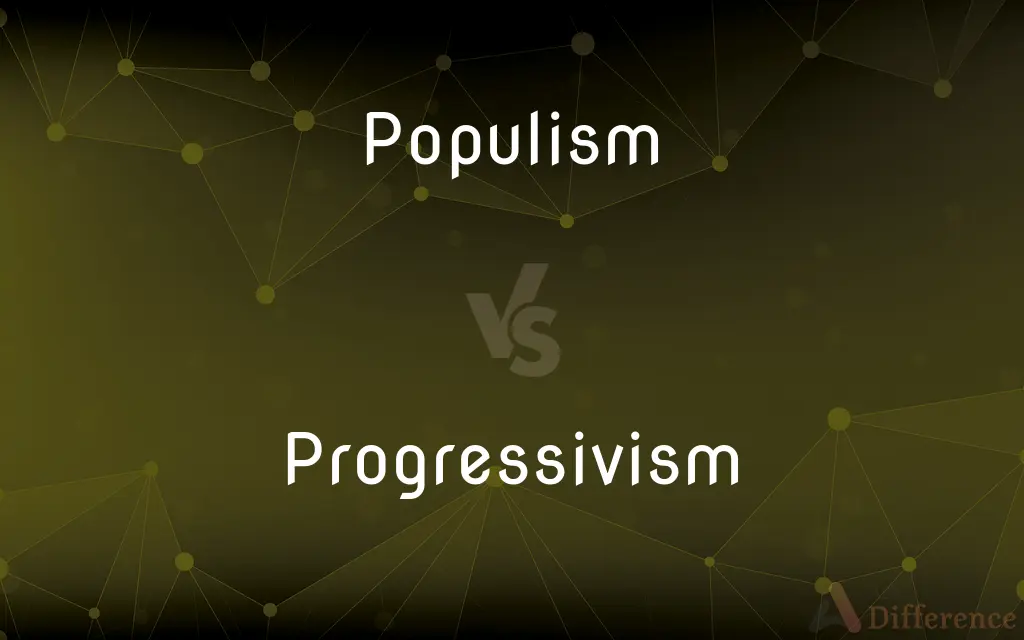Populism vs. Progressivism — What's the Difference?
By Tayyaba Rehman — Updated on September 22, 2023
Populism is appeals to the interests and conceptions of the general people. Progressivism is advocates for reform and change, often for social justice. Both relate to political movements but focus on different ideals.

Difference Between Populism and Progressivism
Table of Contents
ADVERTISEMENT
Key Differences
Populism is a political approach that seeks to appeal to the interests, concerns, and conceptions of the general population, often emphasizing the distinction between the people and the elite. Progressivism, on the other hand, is a broad philosophy that advocates for change and reform, typically in the pursuit of social justice and better conditions for the population.
At the heart of Populism is the belief in the power and righteousness of the people. Populists often argue that the common people are the best arbiters of their fate and that they should wield more influence in political decisions. In contrast, Progressivism is motivated by the idea that societal structures can be improved and that the status quo often needs to be challenged for the betterment of society.
Populism can be found on both the left and right sides of the political spectrum, being driven by the general populace's sentiments, whether conservative or liberal. Progressivism tends to lean more toward the left, emphasizing issues like workers' rights, environmental concerns, and social equality.
In American history, Populism has been associated with movements like the Populist Party of the 1890s, which emphasized agrarian concerns and the challenges faced by farmers. Progressivism, meanwhile, found its peak in the early 20th century, with leaders like Teddy Roosevelt and reforms that addressed issues from labor conditions to food safety.
Comparison Chart
Primary Focus
Interests of the general population
Social reform and justice
ADVERTISEMENT
Political Spectrum
Can be left or right
Typically leans left
Historical Example (US)
Populist Party of the 1890s
Early 20th century reforms
Core Belief
Power to the people
Improvement of societal structures
Perspective on Establishment/Elites
Often critical or oppositional
Seeks to reform or change existing structures
Compare with Definitions
Populism
Pushing for the empowerment of the common person.
Populism was evident in his speeches about returning power to the people.
Progressivism
Pursuit of advancements in justice, rights, and societal well-being.
Progressivism was evident in the push for environmental policies.
Populism
Challenging the established elites in favor of the masses.
Populism drove many to question the decisions of those in power.
Progressivism
Advocacy for social reform and better conditions.
Progressivism played a key role in early labor rights movements.
Populism
Appeals based on the interests of the general populace.
The candidate's Populism resonated with the working class.
Progressivism
Championing progressive change for the betterment of society.
Through Progressivism, many social welfare programs were established.
Populism
A movement emphasizing the power of the people.
Populism can manifest in both liberal and conservative ideologies.
Progressivism
A movement pushing for change in societal structures.
Progressivism seeks to address systemic inequalities.
Populism
A political doctrine centering on the common person.
Populism often emphasizes the divide between the people and the elites.
Progressivism
Working toward advancements in societal conditions and justice.
Progressivism motivated many to fight for equal rights.
Populism
Populism refers to a range of political stances that emphasise the idea of "the people" and often juxtapose this group against "the elite". The term dates back to the Populares, (Latin for 'favoring the people', singular popularis) who were a political faction in the late Roman Republic who favoured the cause of the plebeians (the commoners), and has been applied to various politicians, parties, and movements since that time, although it has rarely been chosen as a self-description.
Progressivism
Progressivism is a political philosophy in support of social reform. Based on the idea of progress in which advancements in science, technology, economic development and social organization are vital to the improvement of the human condition, progressivism became highly significant during the Age of Enlightenment in Europe, out of the belief that Europe was demonstrating that societies could progress in civility from uncivilized conditions to civilization through strengthening the basis of empirical knowledge as the foundation of society.
Populism
A political approach that strives to appeal to ordinary people who feel that their concerns are disregarded by established elite groups
The question is whether he will tone down his fiery populism now that he has joined the political establishment
The Finance Minister performed a commendable balancing act, combining populism with prudence
Progressivism
The principles and practices of political progressives.
Populism
A political philosophy supporting the rights and power of the people in their struggle against the privileged elite.
Progressivism
Progressive education.
Populism
The movement organized around this philosophy.
Progressivism
A political ideology that favours progress towards better conditions in society.
Populism
Populism The philosophy of the Populist Party.
Progressivism
The political orientation of those who favor progress toward better conditions in government and society
Populism
(philosophy) A political doctrine or philosophy that proposes that the rights and powers of ordinary people are exploited by a privileged elite, and supports their struggle to overcome this.
Populism
(derogatory) The practice of appealing to the interests of the common people.
Populism
The political doctrines advocated by the People's party.
Populism
The political doctrine that supports the rights and powers of the common people in their struggle with the privileged elite
Common Curiosities
Can Populism and Progressivism overlap?
Yes, there can be overlap, especially when popular demands align with progressive reforms.
What are some historical examples of Progressivism?
In the US, Progressivism was prominent in the early 20th century with reforms in labor rights and environmental concerns.
What does Progressivism advocate for?
Progressivism advocates for social reform and changes for better societal conditions.
Is Populism always rooted in factual concerns?
Populism is rooted in the sentiments of the people, which can be influenced by various factors, not always factual.
How does Progressivism view societal structures?
Progressivism seeks to improve or reform societal structures for the betterment of society.
What is the core focus of Populism?
Populism centers on the interests and concerns of the general population.
Is Populism left or right-leaning?
Populism can manifest on both the left and right sides of the political spectrum.
How do Populists typically view the elite or establishment?
Populists often view the elite or establishment critically or as oppositional to the people's interests.
Are there specific figures associated with Progressivism?
Teddy Roosevelt is often associated with the Progressive Era in the US.
What has Progressivism contributed to society?
Progressivism has led to numerous reforms, from workers' rights to environmental protections.
Can Populism be seen globally?
Yes, Populist movements can and do arise in various countries, each with its unique characteristics.
Why did Progressivism emerge?
Progressivism emerged as a response to societal challenges, pushing for reforms and improvements.
How does media influence Populism?
Media can amplify populist sentiments, give voice to populist leaders, or shape popular perceptions and concerns.
Are there criticisms of Progressivism?
Yes, critics may view it as too radical, impractical, or dismiss it as idealistic without considering economic or other implications.
Does Populism always lead to positive outcomes?
Populism reflects popular sentiments, which can lead to both positive and negative outcomes, depending on the context.
Share Your Discovery

Previous Comparison
Hives vs. Rash
Next Comparison
Filtration vs. PurificationAuthor Spotlight
Written by
Tayyaba RehmanTayyaba Rehman is a distinguished writer, currently serving as a primary contributor to askdifference.com. As a researcher in semantics and etymology, Tayyaba's passion for the complexity of languages and their distinctions has found a perfect home on the platform. Tayyaba delves into the intricacies of language, distinguishing between commonly confused words and phrases, thereby providing clarity for readers worldwide.














































